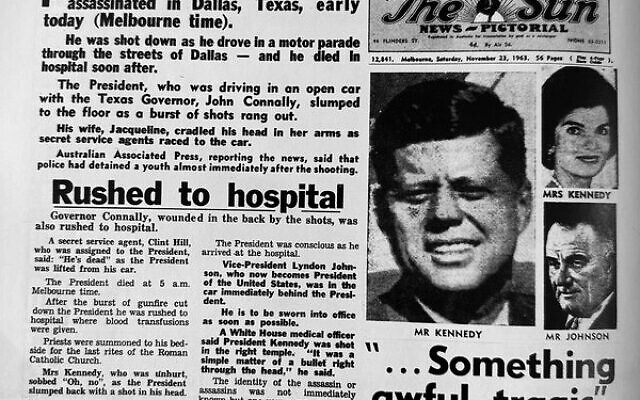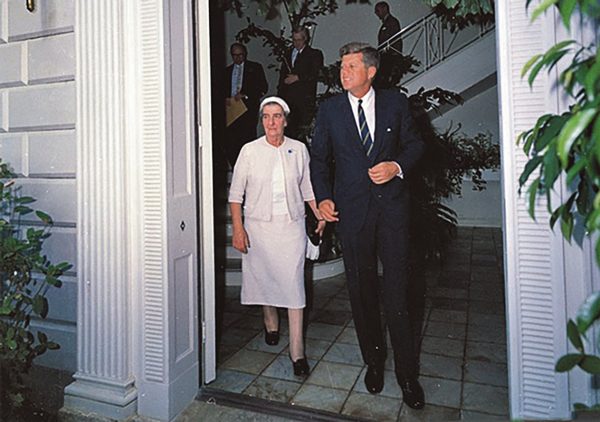A ‘Kennedy child’ remembers
JFK was a consistent friend of Jews and a champion of diversity.

IT’S true that you always remember where you were when you heard the news. That’s how it was for me in Melbourne on Saturday, November 23, 1963, when as a young boy, I heard US president John F. Kennedy had been assassinated.
Sprawled on the living room floor playing with my toys, I heard my mother worriedly announce to my grandmother, “A terrible thing’s happened in America – they’ve shot the president.”
That afternoon, with the newspaper spread out on the dining room table, I’d asked my father: “What’s ‘assassinated’?” Hesitantly, he explained the word to an eight-year-old son who I sensed he’d rather have protected from that.
On Monday, our grade 3 teacher was in tears as she explained what an extraordinary figure Kennedy had been.

Years later, playwright Robert Patrick would write Kennedy’s Children. He didn’t so much mean Patrick, John Kennedy, Jr, and Caroline Kennedy (now US ambassador to Australia) – but the figurative sons and daughters, the Boomers who’d internalised that November day.
The grim choreography of the assassination became a signature of a generation collectively robbed of innocence. It reverberated down the decades – the fatefully open-topped car turning into Dealey Plaza in Dallas, the shots fired by Lee Harvey Oswald from the Texas Book Depository, the frenzied race to Parkland hospital where JFK was pronounced dead, and the desolate flight back to Washington by First Lady Jackie Kennedy, still wearing her blood-spattered dress.
The conspiracy theories around the motorcade persist to this day, fed in part by grainy home-movie footage of the “grassy knoll” from where some say shots were fired – filmed by onlooker Abraham Zapruder. Then two days later, nightclub owner Jack Ruby’s gun fatally silenced Oswald in a Dallas police basement, live on TV. Incidentally both Zapruder and Ruby were Jewish.
Despite US ambassador Joseph Kennedy’s closeness to Nazi Germany in the 1930s, Jews had been excited when his son, a senator from Massachusetts, became America’s youngest – and its first Catholic – president in 1960. It ushered in new horizons of social diversity and became known as the age of Camelot (a Broadway musical that was a Kennedy favourite). The Kennedys had become American royalty.
Lawyer Sam Pisar (stepfather of US Secretary of State Antony Blinken) was a child Holocaust survivor who grew up in Melbourne and studied law at Harvard, before earning a place among JFK’s trade advisers.
At Limmud Oz in 2018, Mount Scopus College history lecturer Avi Cohen noted JFK’s 1960 presidential campaign coincided with the release of the cinema epic Exodus, the story of the birth of modern Israel. President Harry Truman had backed the UN partition plan that established Israel but was sceptical of the young state’s chances of survival. His successor Dwight Eisenhower was supportive but detached, particularly after the 1956 Suez War. Moreover Israel’s socialist kibbutz society had Americans wary.
But the Kennedy campaign utilised the great popularity of Exodus to explain shared democratic values between his country and Israel, which JFK predicted could become a valuable US ally.
During his presidency, relations with Israel were tested though, when Kennedy, a strong opponent of nuclear proliferation, became concerned about Israel’s developments at Dimona.
However, he overrode resistance within his administration and approved the sale of US Hawk missiles to Israel, after the Soviet Union supplied missiles to Egypt and Iraq. Israel and the US have been allies from the Kennedy years onwards.
JFK was a consistent friend of Jews and a champion of diversity. As a senator addressing a 1956 US Conference of Christians and Jews in Boston, he spoke of hiring three advisers at his office.
“No inquiry of their religious affiliation was made when I hired them. I was interested, and remain interested, only in their work. One of these men is a Catholic. One is a Protestant. One is a Jew. All three are at the service of any Massachusetts citizen who requests our help, whatever may be his problem and whatever may be his religious faith.”
Peter Kohn is an AJN senior journalist.

comments